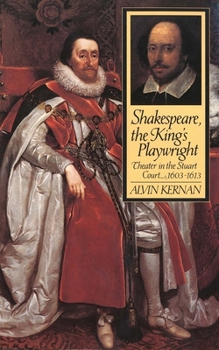Shakespeare, the King's Playwright
Select Format
Select Condition 
Book Overview
Soon after James Stuart became king of England in 1603, William Shakespeare, while still working in the public theater, became the royal playwright, and his acting troupe became the premier playing company of the realm. How did this courtly setting influence Shakespeare's work? What was it like to view, perform in, and write plays conceived for the Stuart king? In this fascinating and lively book, one of our most eminent literary critics explores these questions by taking us back to the court performances of some of Shakespeare's most famous plays, examining them in their settings at the royal palaces of Whitehall and Hampton Court. Alvin Kernan looks at Shakespeare as a patronage playwright whose work after 1603 focused on the main concerns of his royal patron: divine-right kingship in Lear, the corruption of the court in Antony, the difficulties of the old military aristocracy in Coriolanus, and other vital matters. Kernan argues that Shakespeare was neither the royal propagandist nor the political subversive that the New Historicists have made him out to be. He was, instead, a great dramatist whose plays commented on political and social concerns of his patrons and who sought the most satisfactory way of adjusting his own art to court needs.
Format:Paperback
Language:English
ISBN:0300072589
ISBN13:9780300072587
Release Date:September 1997
Publisher:Yale University Press
Length:258 Pages
Weight:0.85 lbs.
Dimensions:0.6" x 6.0" x 9.3"
Customer Reviews
1 rating
What a book!!
Published by Thriftbooks.com User , 19 years ago
Of the many, many thousands of books about Shakespeare, "how many have said something which is both new and true? Not many." (Prof. Lawrence Stone, Princeton Univ.) Prof. Stone goes on to say that this is such a book and so it is. I couldn't agree more. What Kernan does is to concentrate on the later stage of Shakespeare's career, when his company of players became the "King's Men," with King James I himself as official patron. Having obtained the best acting company and playwright for himself, James saw to it that his queen and two offspring at court each had their own acting company, so that the royal family supported four different groups of actors and playwrights. The support was substantial... a performance at the Globe might net a pound or so as total income, whereas James dispensed lump-sum payments of 10, 20 or even 30 pounds for a weekend of palace performances by the King's Men. Kernan places Shakespeare's plays of the period within the context of James I's background, interests and enthusiasms. He also places the plays in the larger context of patronage art. Kernan writes both for scholars and the general public, and his writing style maintains high levels of clarity and even of crafted artistry. The book is simultaneously information-packed, plentiful with new insights, and soundly based in scholarship. Shakespeare, as one of the greatest artists of all time, did not write "for" James I, in any blatantly obvious way (as some other playwrights of the period made the grave mistake of doing), but there is no way to understand the themes and situations of the plays Shakespeare wrote during this period, without an understanding of James I. My highest recommendation.





